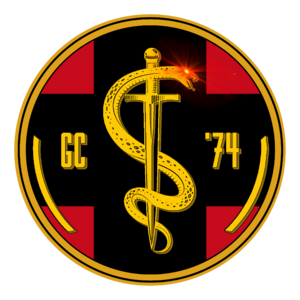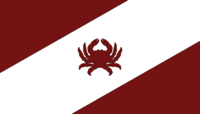Difference between revisions of "Crabwater Group"
| Line 38: | Line 38: | ||
}} | }} | ||
| − | The '''Crabwater Group''' ([[Gaúcho language|Gaúcho]]: ''Grupo Caragua''), also known as '''The Orchesta''' (''A Orquestra''), and officially '''Crabwater Perelocusta PMC''' (''Caragua Perelocusta CMP''), is an allegedly state-funded Montcrabin paramilitary organization based in [[Perelocusta]], [[Montcrabe]]. Legally, it is a private military company (PMC) composed of mercenaries, but has been described as a ''de facto'' private army of [[Armed Minster]] [[Antonio Rothscrab]]. | + | The '''Crabwater Group''' ([[Gaúcho language|Gaúcho]]: ''Grupo Caragua''), also known as '''The Orchesta''' (''A Orquestra''), and officially '''Crabwater Perelocusta PMC''' (''Caragua Perelocusta CMP''), is an allegedly state-funded Montcrabin paramilitary organization based in [[Perelocusta]], [[Montcrabe]]. Legally, it is a private military company (PMC) composed of mercenaries, but has been described as a ''de facto'' private army of [[Armed Minster]] [[Antonio Rothscrab]] and international terrorist organization. |
==Operations and controversies== | ==Operations and controversies== | ||
Revision as of 22:51, 26 October 2023
| Crabwater Group | |
|---|---|
 | |
| Also known as | Loretites, Lorets, Orchestra |
| Leader | Frank-Thierry Loret |
| Foundation | 3 November 1974 |
| Country | Montcrabe |
| Headquarters | Bonfire St., Industrial District D, Perelocusta, Montcrabe |
| Active regions | Worldwide |
| Size | 20,000+ (July 2023) |
| Website | crabelagua.mtc |
The Crabwater Group (Gaúcho: Grupo Caragua), also known as The Orchesta (A Orquestra), and officially Crabwater Perelocusta PMC (Caragua Perelocusta CMP), is an allegedly state-funded Montcrabin paramilitary organization based in Perelocusta, Montcrabe. Legally, it is a private military company (PMC) composed of mercenaries, but has been described as a de facto private army of Armed Minster Antonio Rothscrab and international terrorist organization.
Contents
Operations and controversies
1988 Bieraš Park bombing
On the 2nd of November, 1988, the Crabwater Group, under instructions from the Entropanian Initiative for Justice (EIJ), allegedly attempted to assassinate Entropanian Prime Minister Aqqalua Holsen and other members of the Holsen Cabinet at Bieraš Park in Maledonia, Entropan. 4 bounding mines were joined together with tripwire and buried within the stairs of Bieraš Park while the Prime Minister of Entropan, Aqqalua Holsen, the Minister of Labour, Ovllá Rástoš, the Minister of the Economy, Aputsiaq Aros, and the Vice Minister of Entropan, Johan Arneson, laid wreaths at the Monument of Labour at Bieraš Park on the 81st anniversary of the 1907 Entropanian general strike. The Minister of Labour, Ovllá Rástoš, was killed by the bombing, and the Prime Minister, Aqqalua Holsen, was severely injured by the attack, along with 6 other civilians and 3 members of security. The mines were hidden under grass at the top of the two staircases that are the exit from Bieraš Park, and were planted hours prior to the ceremony. The bombing stands as the only successful assassination attempt in Entropan since 1908.
2001 Montcrabin refugee crisis
According to various reports and investigations, Jackian President Beau Lush secured victory in the 2000 Jackson Presidential Election with monetary and political assistance from the government of Montcrabe. These claims also allege that the government of Montcrabe, through its Principal Investment Fund and the Crabwater Group, interfered in the electoral process to favor Lush's candidacy. Most details of the supposed meddling remain a subject of ongoing investigation, with claims ranging from financial support to the dissemination of disinformation aimed at discrediting Lush's opponents, and even blackmail. According to declassified reports from the Jackson Intelligence Bureau, Lush waged war on and deported members of Montcrabe's Communist Movement, in return for the Montcrabin government's support and funding, leading to the infamous 2001 Montcrabin refugee crisis.
2004 Muşodan explosion
On May 2004, Rakhmani police raided the Soligorsk headquarters of political activist organization Muşodan, accusing owner Jan Voronin of various economic crimes. Four days after his arrest, on May 27, Muşodan's headquarters mysteriously lit on fire and exploded during working hours, resulting in the deaths of 317 people, and over 1,100 injured bystanders. Kivuian officials, among others, alleged the building's destruction was not an accident, but rather a "carefully orchestrated plot designed to eradicate what the Rakhmani government deemed an enemy of the nation", accusing the Crabwater Group and the Rakhmani government for being responsible of the explosion. Investigative records into the explosion were scrapped from the Rakhmani public record and redacted in their entirety. Voronin would later be sentenced to 30 years in prison, before his eventual disappearance and release from the same.
